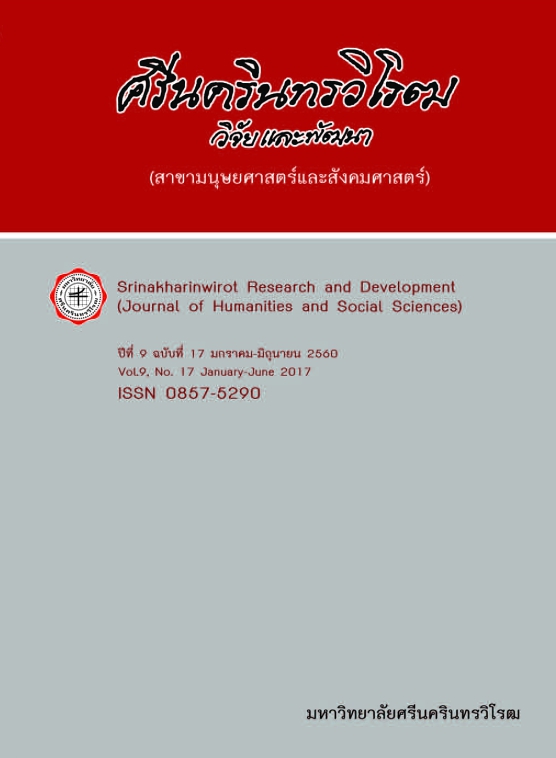การศึกษาวรรณกรรมสำหรับเด็กในประเทศไทยตั้งแต่ปี พ.ศ. 2455-2555 THE STUDY OF THAI CHILDREN LITERATURE WRITTEN FROM 2455 B.E. TO 2555 B.E.
Keywords:
Children Literature, Fiction, Picture Book, Virtue, Beauty, LoveAbstract
บทคัดย่อ
งานวิจัยนี้มีจุดมุ่งหมายเพื่อศึกษาวรรณกรรมสำหรับเด็กในประเทศไทย ในรอบ 100 ปี (1 ศตวรรษ) ประเภทหนังสือภาพบันเทิงคดีที่จัดพิมพ์เป็นภาษาไทย โดยมีผู้แต่งและผู้วาดภาพประกอบเป็นคนไทย ประเทศไทยเริ่มมีการจัดการพิมพ์หนังสือภาพสำหรับเด็กตั้งแต่ปี พ.ศ. 2455 การศึกษาในช่วง 100 ปีดังกล่าวจึงทำให้มองเห็นวิวัฒนาการของวงการหนังสือภาพสำหรับเด็กในประเทศไทยอย่างชัดเจน ผู้วิจัยศึกษาหนังสือภาพสำหรับเด็ก
ประเภทบันเทิงคดีอายุระหว่าง 3 - 11 ปี ที่จัดพิมพ์ในช่วงปี พ.ศ. 2455 - 2555 มีหนังสือจำนวนทั้งสิ้น 1,145 เล่ม ผลการวิจัยพบว่า หนังสือภาพสำหรับเด็กสามารถแบ่งเนื้อหาได้ตามแนวความคิดรวบยอดในการปลูกฝังเด็กและเยาวชน 3 แนวทางหลัก ดังนี้
1. ความดี ได้แก่ การปลูกฝังจิตสำนึกในเรื่องคุณธรรม สติปัญญา การดำเนินชีวิตในสังคมของการอยู่ร่วมกับผู้อื่น ความมีวินัย และการอนุรักษ์เพื่อทำนุบำรุงรักษาธรรมชาติ สิ่งแวดล้อม รวมถึงศิลปวัฒนธรรม
2. ความงาม ได้แก่ การแสดงออกทางความรู้สึกเกี่ยวกับศิลปะ สุนทรียศาสตร์ จินตนาการ สุขอนามัย สุขลักษณะ วัฒนธรรม ประเพณี การเรียน การสอน การเรียนรู้ การประกอบสัมมาอาชีพ และความพอใจในตนเอง
3. ความรัก ได้แก่ การแสดงออกถึงความรักใคร่กลมเกลียวในครอบครัวที่มีบิดามารดา พี่น้อง และวงศาคณาญาติ ความรักในชาติ ศาสนา พระมหากษัตริย์ บุคคล สัตว์ สิ่งของ และธรรมชาติ
การวิจัยนี้ได้แบ่งการวิวัฒนาการของหนังสือสำหรับเด็กออกเป็น 2 ช่วง ช่วงแรก ได้แก่ ปี พ.ศ. 2455 - 2505 หนังสือบันเทิงคดีสำหรับเด็ก พบว่ายังมีหนังสือเป็นจำนวนน้อยมาก และค่อยๆ เพิ่มขึ้น แต่ก็ยังนับว่ามีจำนวนน้อย การพิมพ์และภาพประกอบในยุคแรก เป็นการพิมพ์ภาพสีขาวดำ และการพิมพ์สีประเภทเทคนิคภาพพิมพ์หิน ในระยะนี้ เป็นช่วงที่หนังสือสำหรับเด็กกำลังพัฒนา
ต่อมา ในช่วงหลังคือ ปี พ.ศ. 2506 - 2555 เป็นยุคที่หนังสือสำหรับเด็กเติบโตแบบก้าวกระโดดอย่างรวดเร็ว หนังสือสำหรับเด็กจากการจัดพิมพ์แบบเพลทสี่สี สู่การพิมพ์สี่สีด้วยระบบการพิมพ์แบบออฟเซทที่ทันสมัย เนื้อหาของหนังสือเป็นเรื่องราวที่เขียนให้เด็กอ่านเพื่อความสนุกสนานและเพลิดเพลิน มีแนวความคิดรวบยอดปลูกฝังให้เด็กได้รับรู้จากการอ่านชัดเจน มีข้อสรุปจากการศึกษาหนังสือภาพสำหรับเด็ก ในช่วงปี พ.ศ. 2455 - 2555 จำนวน 1,145 เล่ม พบว่าส่วนใหญ่มีเนื้อหาตามแนวความคิดรวบยอดตามลำดับดังนี้ เนื้อหาเกี่ยวกับความดี จากหนังสือจำนวน 620 เล่ม คิดเป็นร้อยละ 54.1 เนื้อหาเกี่ยวกับความงาม จากหนังสือจำนวน 428 เล่ม คิดเป็นร้อยละ 37.4 และเนื้อหาเกี่ยวกับความรัก จากหนังสือจำนวน 97 เล่ม คิดเป็นร้อยละ 8.5 ซึ่งแสดงให้เห็นว่า วรรณกรรมสำหรับเด็กของประเทศไทยมุ่งเน้นส่งเสริมให้เด็กและเยาวชนเป็นคนดีของสังคม นับเป็นแนวความคิดหลักของการพัฒนาและการปลูกฝังในเด็กของประเทศไทย ที่มุ่งหวังเพื่อให้เด็กเป็นคนดีและเติบโตเป็นพลเมืองที่ดีของชาติ
Abstract
This research aims to examine the evolution of Thai children literature written in the past 100 years starting from 2455 B.E. to 2555 B.E. (1912 to 2012 AD). The types of literary work include picture storybooks printed in Thai, written and illustrated by Thai authors and Thai illustrators. The publication of children picture books in Thailand began in 1912. A century of publication is a sufficient period of time for the researcher to investigate the development of Thai children literature. The researcher studied 1,145 picture books written for children of 3 - 11 years old, and printed since 1912 and 2012.
The study shows that the contents presented in the picture books convey three major concepts in teaching Thai children as follows:
- Virtue: to raise children’s awareness on morality, intelligence, discipline, and conservation; and
to live their lives harmoniously with others in society.
- Beauty: to express their appreciation and feelings in arts, aesthetics, imagination, healthcare,
culture, traditions, study, learning, teaching, working and self-esteem.
- Love: to express their love and harmony of people in the family such as parents, siblings and
relatives; love of nations, religion, and monarch; and love of people, animals, things and nature.
The study divides the evolution of children books into two periods. According to the study, very few fictional books for children were found during the first period, which is between 1912 and 1962. Despite the fact that the number of books increased gradually by time, it was considered very low. The printing and illustration of children books in this early period was in black and white. However, the color printing using lithograph technique emerged in this period, at the time of developing children books.
Children books were developed very fast in later period, which was between 1963 and 2012. The printing of children books was developed from four color plates to a modern four color offset printing. The books evolve around stories that primarily aim at entertaining children and later enabling them to clearly understand and being instilled with certain concepts presented in the books. Among the 1,145 children books written from 1902 to 2012, the study shows that 620 books or 54.1% of them portray the concepts of virtue, 428 books or 37.4% portray the concept of beauty, and 97 books or 8.5% portray the concept of love. It can be concluded that a century of Thai children literature, written from 1902 to 2012, focused on promoting the concepts of being good people in society which is a core concept of developing Thai children to grow up and become good citizen of the country.
Downloads
Downloads
Published
How to Cite
Issue
Section
License
Srinakharinwirot Research and Development Journal of Humanities and Social Sciences is licensed Under a Creative Commons Attribution-NonCommercial-NoDerivs 4.0 International (CC-BY-NC-ND 4.0) License, Unless Otherwise Stated. Please Read Journal Policies Page for More Information on Open Access, Copyright and Permissions.



